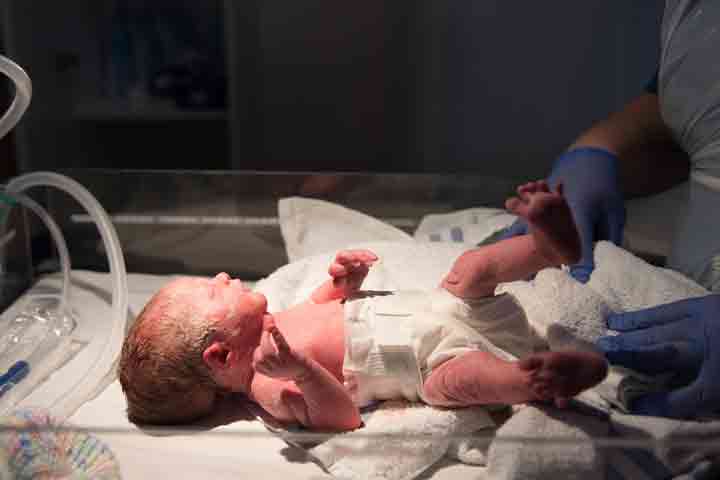A premature baby’s survival rate and development may vary depending on how early they are born before the due date. Nearly 15 million babies are born prematurely, and in the US, one in every 10 babies are preemies (1) (2).
Significant developments occur in the fetus during each week of pregnancy; hence, prematurely born babies may lack a few of these developments, even though they can survive outside the womb. However, babies born near the due date may have better growth and development.
Read on to learn more about a preterm baby’s survival rates and risk factors.
Definition Of Premature Birth
According to the World Health Organization, preterm or premature birth is defined as when babies are born alive before the completion of 37 weeks of pregnancy (1). Based on the gestational age or age of the pregnancy, preterm delivery or childbirth can be further divided into the following categories (1).
- Extremely preterm: When a baby is born before 28 weeks
- Very preterm: When a baby is born between 28 and 32 weeks
- Moderate or late preterm: When a baby is born between 32 and 37 weeks
It is usually recommended that unless there is a medical emergency or a serious health condition, cesarean birth or induced labor (induction) should not be planned before 39 weeks of gestation. However, with advances in medical sciences, it is estimated that about 9 out of 10 babies born prematurely survive and have normal growth (3).
Factors Affecting Survival Of Preterm Babies
A National Institutes of Health study that observed 4,000 newborns found that the following factors affect the survival and disability in preterm babies (4).
- Baby’s gender
- Maternal age
- Birth weight
- multiple pregnancies
- Whether the mother was given medication to stimulate the development of fetus
- Infections and chronic conditions (eg. diabetes, hypertension, etc.)
The researchers found that there were better chances of survival without a disability when the baby was a female, was of older gestational age, had higher birth weight, was born as a single baby, and the mother received medication, such as antenatal steroids, to stimulate fetal growth (4).
Since preterm babies are not able to meet growth milestones during pregnancy, they may have serious health problems. In 2018, preterm birth and low-birth weight accounted for 17% mortality in newborns (2). However, babies who survive may develop respiratory problems, digestive problems, or bleeding issues in the brain.
They may also have a higher risk of developing long-term health conditions, such as cerebral palsyiXA group of disorders affecting the body’s movement, posture, and coordination, learning disabilities, developmental delay, or lower performance in schools (2) (5)
What To Expect After An Extremely Premature Birth?
The extremely preterm babies require advanced care from specialized experts, including obstetricians, neonatologistsiX Healthcare providers who specialize in the care of premature babies, maternal-fetal-medicine specialists, and other specialized pediatricians (6).
The first thing to consider after an extremely premature birth is whether the baby is capable of breathing and whether the parents and doctors decide to resuscitate the baby. When resuscitation doesn’t work, doctors try to make the baby comfortable instead of using treatment to help them survive (7).
The treatment, in such cases, is dependent on the following factors (7).
- Whether the brain of the baby has incurred any damage, which can occur due to lack of oxygen or bleeding in the brain
- Physical health of the baby
- Gestational age at which the baby is born
The first month after birth is the most crucial period because that is when the baby experiences major problems (7).
Very rarely, babies born before 23 weeks survive. Babies born between 23 and 25 weeks may survive but may experience long-term disabilities (6). This happens because the vital organs are not completely formed.
Preterm Survival Rates
Below are the survival rates for preterm babies born at different gestational ages.
- Babies born less than 24 weeks: Babies born before 24 weeks have a rare chance of survival, their chance of survival is usually less than 50% However, if they do survive, they may have life-long health complications.
The graph illustrates the survival rates of premature babies born at 24 weeks in different high income countries. According to the study, Japan has the highest survival rate and France the lowest (16).
Survival of preterm infants born at 24 weeks
Source: Preterm birth and sustained inflammation: consequences for the neonate. Seminars in Immunopathology.
- Babies born at 26 weeks: Babies born at 26 weeks have about a 78% chance of survival. Moreover, in the long-term 4 out of 10 children develop problems with vision, hearing or, intellectual development (8) (9).
Hayley Petts, a mother and blogger, had a premature delivery. Reflecting on her experience, she says, “I was just 24 weeks pregnant when my waters ruptured… I stayed in the hospital for about five days on bed rest. My baby didn’t arrive, so I was allowed home… On Valentine’s Day 2016, I had a huge bleed. We called my midwife, who told us to phone an ambulance.
“We arrived at the hospital at about 6 pm. I was examined, monitored, and scanned. They were confident that I wasn’t in labor. It was around 8 pm… all of a sudden, I felt this immense pressure in my bottom along with a powerful contraction. She (my midwife) had a look and could see the baby. The room was filled with medical staff; it was hectic and urgent. They whisked my baby off to a room across the corridor, the room emptied… What followed was a long 11 and a half weeks in hospital. He suffered a collapsed lung, numerous suspected infections, not gaining enough weight, reflux, retinopathy of prematurity (ROP), oxygen dependency… but we got there (i).”
- Babies born at 28 weeks: Babies born at 28 weeks have an 80% to 90% chance of survival. Statistically, they only have a 10% chance of developing long-term health problems, which include breathing problems, infections, digestive problems, and blood-related problems (8).
- Babies born at 30 to 32 weeks: When a baby is born at 32 weeks, the chances of survival can be as high as 95%. Also, the chances of mortality and development of long-term health problems decrease drastically (8).
- Babies born at 34 to 36 weeks: A baby born at or after 34 weeks has similar health outcomes as that of a baby born after a complete gestation period of 40 weeks. Thus, the baby is more likely to be as healthy as the baby who was not born prematurely. Also, in the long-term, the babies do well and are generally as healthy as full-term babies. However, doctors may still recommend hospital (neonatal) care for one or two more weeks (8).
It is important to note that statistics may not apply to all babies. Every baby is different. Also, survival rate factors, mentioned earlier, have a significant role to play in the prognosis.
According to Dr. Rosemary Higgins, M.D. at NICHD’s Neonatal Research Network, “an increase in survival rates of preterm babies is linked with increased access to cesarean sections. Also, this surgical intervention might aid in less trauma to the infant and improved survival outcomes (17)..
Risk Of Disabilities At Each Stage
Due to immature organs, babies who survive preterm birth develop both short-term and long-term complications. Preterm babies may develop various health problems, including (7):
- Respiratory problems: May range from transient tachypneaiXA term used for fast and shallow breathingof newborns to bronchopulmonary dysplasiaiXA chronic breathing disorder that occurs in premature babies whose lungs are not fully developed .
- Neurologic outcomes: Neurosensory impairments such as deafness, blindness, hypo- or hypertonia, poorer cognitive performances, as well as neurodevelopmental abnormalities.
- Cerebral palsy: A non-progressive motor disability that results in plegiasiXA term used for complete paralysis of one or more muscles, spasticityiXA condition where there is stiffness in the muscles due to damage in the nerve pathways of the brain or spinal cordand dystoniaiX A neurological muscle disorder characterized by involuntary, painful muscle contractions. Its signs may appear when the child is between one and three years old.
- Learning disabilities: These may appear when the child starts school.
The chances of developing health problems may vary according to the age (7) (9).
- For babies born at 24 weeks, 60% of them may not have a disability at three years of age.
- For babies born at 25 weeks, 70% of them may not have a disability at three years of age.
- For babies born at 26 weeks, 80% of them may not have a disability at three years of age.
About 50% of babies born between 23 and 25 weeks may develop behavior- and attention-related problems by the age of six years. They may also have difficulty adjusting to school (7).
Nearly 40% of babies born between 25 and 26 weeks may develop problems related to hearing, vision, and intellectual development. These problems may carry on to adulthood (7).
What To Ask Your Doctor?
During pregnancy, you should make sure to visit your doctor for antenatal care during the first 12 weeks. The doctor can compute for your due date, using your last menstrual period or based on your earliest ultrasound, and perform necessary physical exams, and discuss risk factors or concerns, if any (8). The doctor can also monitor for presence of any infection or inflammation across the entire duration of pregnancy to avoid any risk factors that would greatly affect the baby.
Knowing about the following can help you prepare well for taking care of the baby. You may ask the following questions to the doctor to dispel your doubts.
- What is the gestational age at which my baby will be born?
- Does the baby have any developmental issues before birth? What are the associated complications of it? What tests were run to check the severity?
- What treatments will be used in my baby’s care before birth? What are the risks and benefits of each of these treatments? Are there any alternatives?
- What consequences should I look out for after discharge from the hospital? What can be the potential health problems in the first year or when the child starts school?
- What type of follow-up will my baby need after birth? How many revisits might be required after birth?
The advancements in medical science and technology have allowed doctors to determine the possible risks associated with the baby’s premature birth and take the necessary precautions. The early period can be divided into various categories, and the duration for which the baby needs to be kept under observation after a premature delivery depends upon it. Therefore, it is advised that you take proper prenatal care, attend regular checkups, and refrain from performing activities that might increase the risks of premature delivery.
Key Pointers
- Babies born beyond 28 weeks of gestational age have better survival rates than those born earlier.
- Birth weight, baby’s gender, and maternal age are a few important factors determining a premature baby’s survival rate.
- Babies born too early can survive with advanced medical support and care. However, there is a risk of them developing various disabilities in later stages.
Premature babies may show less development than any normally born baby. Check out this video where a medical expert shares the latest information on the possible survival rates and what role parents have.















